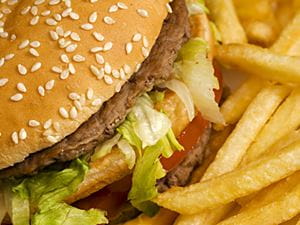
University of Montreal researchers have found that diets high in fat increase depressive behavior and anxiety in mice. The study, published in the International Journal of Obesity, noted that high fat foods are indeed comforting, but that their feel good effect has an addictive quality, leading to a comedown that creates depression. In the study, researchers studied a particular strain of mice that are susceptible to obesity. One group was fed a low fat diet while the other consumed a diet high in saturated fat.
After twelve weeks on the diet, the mice went through a series of tests to measure their behaviors, including an anxiety test that measures how rodents respond to a new environment. The mice who consumed the high fat diet were less active, avoided open areas and explored less – all key traits of higher anxiety levels in animals. A swim test commonly used by drug companies to test new antidepressants, measured something called “behavioral despair” by forcing the mice to swim for six minutes in a glass cylinder filled with water. The mice on the high fat diet stopped swimming and trying to escape soon into the test, compared to their low fat peers.
Study author Dr. Stephanie Fulton noted that, “Animals that give up quickly — they stop swimming and just float and stop trying to pull themselves out of the beaker — that’s (a sign of) self-helplessness.” When looking at the animals’ brains, they found high levels of the stress hormone corticosterone, and changes to the proteins that regulate reward and emotions. The type of fat could make a difference.
Mice who consumed the same amount of fat – but healthy fats such as olive oil – experienced less depression and anxiety. Of course, there is also the fact that the extra fat on the bodies of the mice eating the high fat diet contributed to their slower performance on the swim test. “In the short-term high-fat food feels comforting, but in the long-term, and with increasing adiposity (fat mass) it is having negative effects on mood. We know that diet is a large contributor to the obesity epidemic throughout the world,” Fulton noted in the study.

